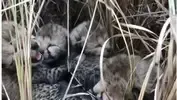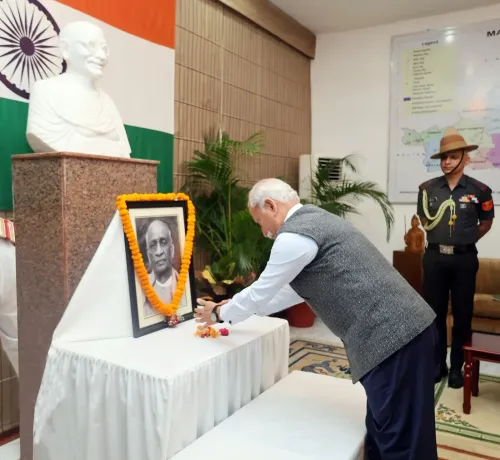Have Five Cheetah Cubs Been Born in MP's Kuno National Park?

Synopsis
Key Takeaways
- Nirva has given birth to five cubs.
- The cheetah population in KNP has risen to 29.
- This event marks a significant milestone in India's biodiversity efforts.
- The cheetah reintroduction project began with animals brought from Namibia and South Africa.
- Conservation efforts are crucial for restoring India's natural heritage.
Bhopal, April 28 (NationPress) In a significant global initiative aimed at conserving the endangered cheetah, an exciting development has occurred in Madhya Pradesh’s (MP) Kuno National Park (KNP) located in Sheopur district. Nirva, a five-year-old female cheetah, has given birth to five cubs, marking a pivotal achievement in the ongoing translocation endeavor.
Dr. Mohan Yadav, the Chief Minister of Madhya Pradesh, announced this remarkable news on his X platform, saying, "Once more, Kuno National Park has provided us with fantastic news. Nirva, a five-year-old female cheetah, has welcomed five healthy cubs, elevating the total number of cheetahs in the state to 31."
He commended the commitment of the Kuno National Park team and credited this success to India’s efforts in biodiversity conservation under the guidance of Prime Minister Narendra Modi.
Union Minister for Environment, Forest and Climate Change Bhupendra Yadav also expressed his joy about the event, sharing the update on X as well.
Earlier this month, two cheetahs, Prabhas and Pavak, were moved to Gandhisagar in Mandsaur as part of an intra-regional translocation strategy, reducing the cheetah count in KNP to 24. However, with the birth of these five cubs, the KNP cheetah population has now increased to 29.
India’s native Asiatic cheetah went extinct in the mid-20th century, leaving its survival confined to a critically endangered population in Iran. To reintroduce cheetahs into Indian wildlife, eight Southeast African cheetahs—a non-native subspecies—were transported from Namibia in September 2022.
Prime Minister Narendra Modi released them into enclosures at Kuno National Park on September 17, 2022. This historic event marked the cheetah's return to India. Following that, in February 2023, twelve additional cheetahs were imported from South Africa.
The initiative to reintroduce cheetahs in India has roots extending back to the mid-20th century. Although proposals were made to Iran in the 1970s and to Kenya in the 1980s, they encountered limited success. By 2012, India’s Supreme Court had initially ruled such translocation projects illegal, citing concerns over introducing a new species rather than restoring a native one. Nonetheless, recent advancements have rejuvenated this ambitious endeavor, yielding promising outcomes.









